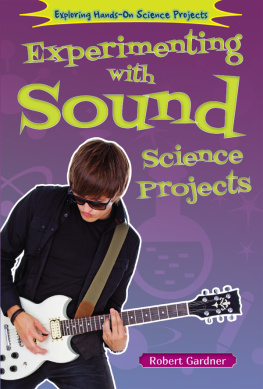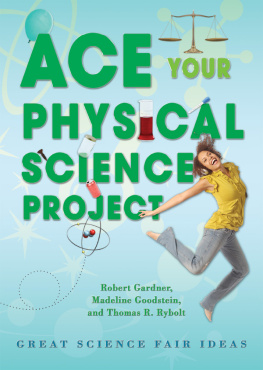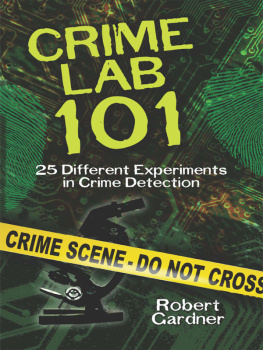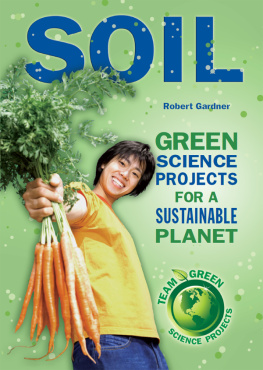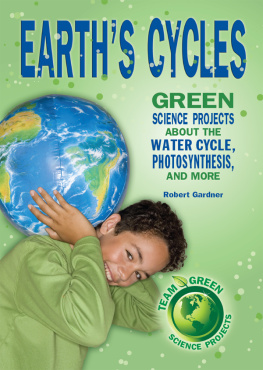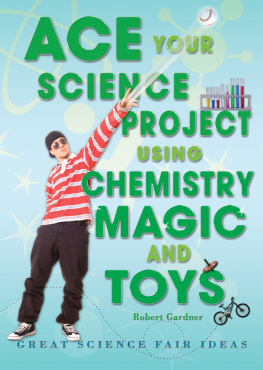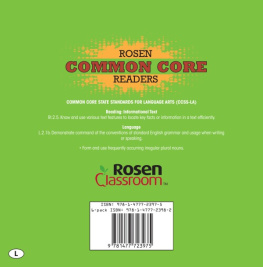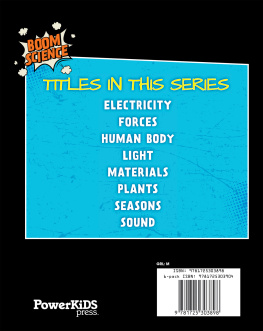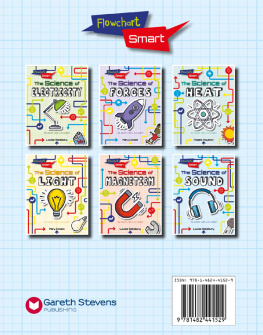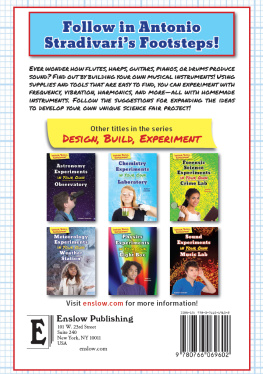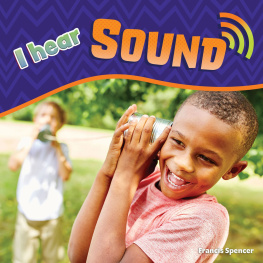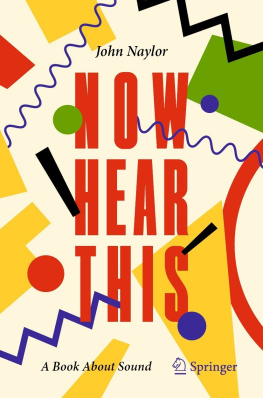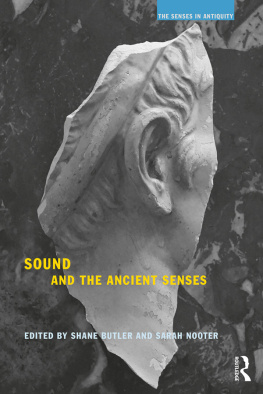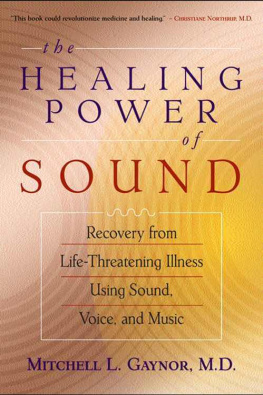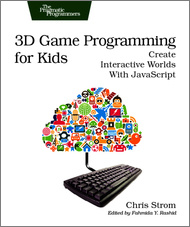Robert Gardner - Experimenting with Sound Science Projects
Here you can read online Robert Gardner - Experimenting with Sound Science Projects full text of the book (entire story) in english for free. Download pdf and epub, get meaning, cover and reviews about this ebook. year: 2013, publisher: Enslow Publishers, Inc., genre: Children. Description of the work, (preface) as well as reviews are available. Best literature library LitArk.com created for fans of good reading and offers a wide selection of genres:
Romance novel
Science fiction
Adventure
Detective
Science
History
Home and family
Prose
Art
Politics
Computer
Non-fiction
Religion
Business
Children
Humor
Choose a favorite category and find really read worthwhile books. Enjoy immersion in the world of imagination, feel the emotions of the characters or learn something new for yourself, make an fascinating discovery.
- Book:Experimenting with Sound Science Projects
- Author:
- Publisher:Enslow Publishers, Inc.
- Genre:
- Year:2013
- Rating:5 / 5
- Favourites:Add to favourites
- Your mark:
- 100
- 1
- 2
- 3
- 4
- 5
Experimenting with Sound Science Projects: summary, description and annotation
We offer to read an annotation, description, summary or preface (depends on what the author of the book "Experimenting with Sound Science Projects" wrote himself). If you haven't found the necessary information about the book — write in the comments, we will try to find it.
This book describes how its possible to hear and feel sound, how sound travels and moves, as well as dimensions of space. It discusses making sounds and noises, waves, properties of sound and sound effects. It also includes sounds of music.
Experimenting with Sound Science Projects — read online for free the complete book (whole text) full work
Below is the text of the book, divided by pages. System saving the place of the last page read, allows you to conveniently read the book "Experimenting with Sound Science Projects" online for free, without having to search again every time where you left off. Put a bookmark, and you can go to the page where you finished reading at any time.
Font size:
Interval:
Bookmark:
Let's Hear It for Sound!
How is it possible to hear and feel sound with the touch of a balloon? Can you figure out how sound moves? How can you make waves on a rope that travels in all three dimensions of space? The physical science experiments in this book will help you learn about sound waves, sound and music, the properties of sound, and more. The ideas introduced, along with details of the scientific method, will help you to perform challenging, educational, and fun science fair projects!
ABOUT THE AUTHOR
Robert Gardner is an award-winning author of science books for young people. He is a retired high school teacher of physics, chemistry, and physical science. In 2010, he received the Lifetime Achievement Award in Hands-On Science Writing from AAAS/Subaru Science Books & Films.

This book is filled with projects and experiments related to sound, from noises that grate the nerves to music that soothes the soul. You will find that you can learn a lot about sound by doing experiments. Most of the materials you will need to carry out your investigations can be found in your home, a hardware store, or a supermarket. For a few experiments, you may want to borrow an item or two from your schools science department. If the schools policy prevents your teachers from letting you take equipment home, you can probably carry out these experiments at school during free time.
For some of the experiments, you will need one or more people to help you. It would be best if you work with friends or adults who enjoy experimenting as much as you do. In that way, you will all enjoy what you are doing. If any experiment involves the risk of injury, it will be clearly stated in the text. In some cases, to avoid any danger, you will be asked to work with an adult. Please do so. We do not want you to take any chances that could cause you injury or pain.
Like a good scientist, you will find it useful to record your ideas, notes, data, and anything you can conclude from your experiments in a notebook. By doing so, you can keep track of the information you gather and the conclusions you reach. Record keeping will allow you to refer to experiments you have done that may help you in doing other projects in the future. In some of the experiments, you will have to make some calculations. Therefore, you may find it helpful to have a pocket calculator nearby as you do these experiments and analyze the data you collect.
Some of the projects in this book may be appropriate for a science fair. Those projects are indicated with an asterisk (*). However, judges at such fairs do not reward projects or experiments that are simply copied from a book. For example, plugging numbers into a formula you do not understand will not impress judges. A graph of data collected from experiments you have done that is used to find a relationship between two variables would be more likely to receive serious consideration.
Science fair judges tend to reward creative thought and imagination. It is difficult to be creative or imaginative unless you are really interested in your project. Consequently, you should be sure to choose a subject that appeals to you. And before you jump into a project, consider, too, your own talents and the cost of materials you will need.
If you decide to use a project found in this book for a science fair, you should find ways to modify or extend it. This should not be difficult, because you will probably discover that as you do these projects, new ideas for experiments will come to mindexperiments that could make excellent science fair projects, particularly because the ideas are your own and are interesting to you.
If you decide to enter a science fair and have never done so before, you should read some of the books listed in the Further Reading. These books deal specifically with science fairs and will provide plenty of helpful hints and lots of useful information that will enable you to avoid the pitfalls that sometimes plague first-time entrants. You will learn how to prepare appealing reports that include charts and graphs, how to set up and display your work, how to present your project, and how to relate to judges and visitors.
Most of the projects included in this book are perfectly safe. However, the following safety rules are well worth reading before you start any project.
- Do any experiments or projects, whether from this book or of your own design, under the supervision of a science teacher or other knowledgeable adult.
- Read all instructions carefully before proceeding with a project. If you have questions, check with you supervisor before going any further.
- Maintain a serious attitude while conducting experiments. Fooling around can be dangerous to you and to others.
- Wear approved safety goggles when you are working with a flame or doing anything that might cause injury to your eyes.
- Do not eat or drink while experimenting.
- Have a first-aid kit nearby while you are experimenting.
- Do not put your fingers or any object other than properly designed electrical connectors into electrical outlets.
- Never experiment with household electricity except under the supervision of a knowledgeable adult.
- Do not touch a lit high-wattage bulb. Lightbulbs produce heat as well as light.
- Many substances are poisonous. Do not taste them unless instructed to do so.
- If a thermometer breaks, inform your adult supervisor. Do not touch either the mercury or broken glass with your bare hands.
When scientists have a question to answer, they start by researching. They read scientific literature and consult online science databases that are maintained by universities, research centers, or the government. There, they can study abstractssummaries of reportsby scientists who have conducted experiments or done similar research in the field.
In this way, they find out whether other scientists have examined the same question or have tried to answer it by doing an experiment. Careful research will tell what kind of experiments, if any, have been done to try to answer the question.
Scientists dont want to repeat experiments that have known and accepted outcomes. Also, they want to avoid repeating any mistakes others may have made while doing similar experiments. If no one else has done scientific work that answers the question, scientists then do further research on how best to do the experiment.
While researching for the experiment, the scientist tries to guessor predictthe possible results. This prediction is called a hypothesis.
The scientist hopes that a well-researched and carefully planned experiment will prove the hypothesis to be true. At times, however, the results of even the best-planned experiment can be far different from what the scientist expected. Yet even if the results indicate the hypothesis was not true, this does not mean the experiment was a failure. In fact, unexpected results can provide valuable information that leads to a different answer or to another, even better, experiment.
A scientific experiment starts when someone wonders what would happen if certain conditions were set up and tested by following a specific process. For example, in an experiment testing the ability of table salt (sodium chloride) to conduct electricity, you can ask the question: Is table salt more conductive when it is dissolved in water to make a saltwater solution?
To find the answer, some possible guesses, hypotheses, would be:
- Solid table salt conducts electricity better than saltwater.
- Saltwater conducts electricity better than solid table salt.
Font size:
Interval:
Bookmark:
Similar books «Experimenting with Sound Science Projects»
Look at similar books to Experimenting with Sound Science Projects. We have selected literature similar in name and meaning in the hope of providing readers with more options to find new, interesting, not yet read works.
Discussion, reviews of the book Experimenting with Sound Science Projects and just readers' own opinions. Leave your comments, write what you think about the work, its meaning or the main characters. Specify what exactly you liked and what you didn't like, and why you think so.

